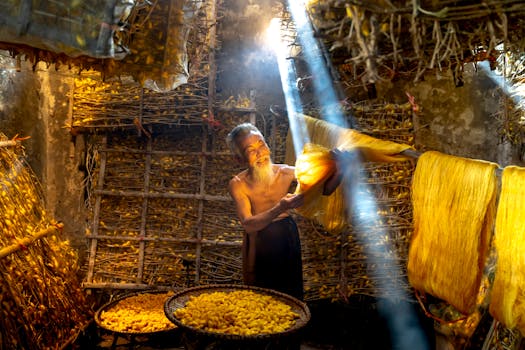
Natural Fibers, Global Markets: Africa’s Role in the Sustainable Textile Revolution
Natural Fibers, Global Markets: Africa’s Role in the Sustainable Textile Revolution. The global textile industry is undergoing a significant transformation, driven by growing demand for sustainable and eco-friendly products. Natural fibers, such as cotton, wool, and silk, are at the forefront of this revolution, and Africa is poised to play a significant role in this market. With its vast resources of natural fibers and growing textile industry, Africa has the potential to become a major player in the global sustainable textile market.
The global natural fiber market is projected to grow significantly in the coming years, driven by increasing consumer demand for sustainable products. According to a report by the International Cotton Advisory Committee, the global cotton market is expected to reach $44.4 billion by 2025, growing at a compound annual growth rate (CAGR) of 4.5%. Other natural fibers, such as wool and silk, are also experiencing significant growth, driven by their unique properties and benefits.
Africa is home to a significant proportion of the world’s natural fiber production, with countries such as Egypt, South Africa, and Morocco being major producers of cotton, wool, and other natural fibers. The continent’s textile industry is also growing rapidly, with many countries investing heavily in textile manufacturing and production. For example, Ethiopia has invested heavily in its textile industry, with the aim of becoming a major player in the global textile market.
The Benefits of Natural Fibers
Natural fibers have several benefits that make them an attractive option for consumers and manufacturers. They are biodegradable, non-toxic, and require less energy to produce than synthetic fibers. Natural fibers also have unique properties, such as breathability, softness, and durability, which make them ideal for a wide range of applications, from clothing and textiles to industrial products and composites.
In addition to their environmental benefits, natural fibers also have social and economic benefits. The production of natural fibers provides income and employment opportunities for millions of people around the world, particularly in rural areas. The textile industry is also a significant contributor to many countries’ economies, with the global textile industry valued at over $3 trillion.
Africa’s Role in the Sustainable Textile Revolution
Africa has the potential to play a significant role in the sustainable textile revolution, driven by its vast resources of natural fibers and growing textile industry. The continent’s textile industry is growing rapidly, with many countries investing heavily in textile manufacturing and production. For example, the African Cotton and Textile Industries Federation (ACTIF) has launched several initiatives to promote the development of the textile industry in Africa, including the creation of a regional textile policy and the establishment of a textile research institute.
In addition to its textile industry, Africa is also home to a significant proportion of the world’s natural fiber production. The continent’s cotton production, for example, accounts for over 20% of global production, with countries such as Egypt, South Africa, and Morocco being major producers. Other natural fibers, such as wool and silk, are also produced in significant quantities in Africa, with countries such as South Africa and Kenya being major producers.
Challenges and Opportunities
Despite the many benefits of natural fibers and Africa’s potential to play a significant role in the sustainable textile revolution, there are several challenges that need to be addressed. One of the major challenges facing the textile industry in Africa is the lack of investment in infrastructure and technology. Many textile manufacturers in Africa lack access to modern machinery and equipment, which can make it difficult for them to compete with manufacturers in other regions.
Another challenge facing the textile industry in Africa is the lack of access to international markets. Many textile manufacturers in Africa struggle to export their products to international markets, due to a lack of trade agreements and other restrictions. However, there are also opportunities for African textile manufacturers to access international markets, particularly in the European Union and the United States.
Conclusion
In conclusion, Africa has the potential to play a significant role in the sustainable textile revolution, driven by its vast resources of natural fibers and growing textile industry. The continent’s textile industry is growing rapidly, with many countries investing heavily in textile manufacturing and production. However, there are several challenges that need to be addressed, including the lack of investment in infrastructure and technology, and the lack of access to international markets.
Despite these challenges, the future of the textile industry in Africa looks bright, with many opportunities for growth and development. With the right investment and support, Africa can become a major player in the global sustainable textile market, providing income and employment opportunities for millions of people and contributing to the continent’s economic development.




